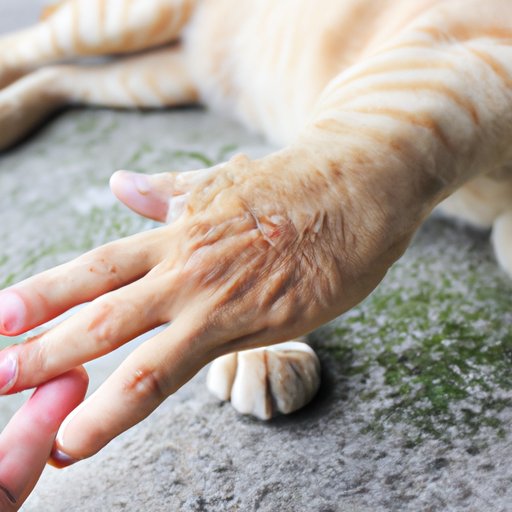Introduction
Cats have been beloved pets for centuries, and with good reason – they make wonderful companions. But are cats bad for your health? While cats can be great additions to any home, there are some potential health risks that should be considered before bringing one in. This article will explore why cats may be bad for your health, and provide tips on how to reduce the risk of any health concerns.
Cats as Allergy Triggers
One of the primary reasons cats may be bad for your health is that they can trigger allergies. Cats produce a number of common allergens, such as dander, saliva, urine, and fur. These allergens can cause reactions ranging from sneezing and watery eyes to more serious respiratory issues. If you or someone in your home has cat allergies, it’s important to take steps to minimize exposure to these allergens.
Symptoms of cat allergies can range from mild to severe, and can include sneezing, congestion, coughing, wheezing, itchy eyes, and skin irritation. Allergy medications can help to manage symptoms, but avoiding contact with cats is the best way to prevent an allergic reaction.

Risks of Cat Bites and Scratches
Another health concern associated with cats is the potential for infection from cat bites and scratches. Cat bites can easily become infected, due to the bacteria present in their mouths. Additionally, cats can also carry rabies, so any scratches should be treated immediately. If a cat bite or scratch breaks the skin, it’s important to seek medical attention right away to reduce the risk of infection or disease.
Treatment for cat bites and scratches usually involves antibiotics to prevent and treat any infections. In some cases, a tetanus shot may also be recommended. It’s important to keep the wound clean and covered until it has healed completely.

Health Concerns with Cat Litter
Cat litter can also pose a health risk, particularly if it is not properly maintained. The dust from cat litter can contain mold, bacteria, and other allergens that can cause respiratory issues if inhaled. Additionally, cats can also ingest cat litter, which can lead to gastrointestinal problems.
To reduce the risk of health concerns from cat litter, it’s important to keep the litter box clean and change the litter regularly. Additionally, using clumping litter can help to reduce the amount of dust in the air. Finally, using a litter box with a lid can help to contain the dust and reduce exposure.
Risk of Parasitic Infections from Cats
Cats can also transmit a variety of parasitic infections, including worms and fleas. These parasites can cause a range of symptoms, such as fatigue, vomiting, diarrhea, and abdominal pain. Additionally, they can also cause skin irritation and itching. To reduce the risk of parasitic infections, it’s important to keep cats up-to-date on their vaccinations and flea treatments. Additionally, it’s important to keep the cat indoors to reduce the risk of them coming into contact with infected animals.
If a parasitic infection does occur, treatment typically involves a combination of medication and lifestyle changes. Medication is used to kill the parasites, while lifestyle changes, such as improved hygiene and diet, can help to prevent future infections.

Potential for Disease Transmission from Cats
Finally, cats can also transmit certain diseases to humans, including toxoplasmosis and ringworm. Toxoplasmosis is caused by a parasite found in cat feces, and can cause flu-like symptoms, such as fever, chills, and body aches. Ringworm is a fungal infection that can cause a rash on the skin.
To reduce the risk of disease transmission from cats, it’s important to practice good hygiene around cats, such as washing your hands after handling them and cleaning up any messes promptly. Additionally, it’s important to keep cats up-to-date on their vaccinations to reduce the risk of disease transmission.
Conclusion
Overall, cats can be great companions, but there are several potential health risks associated with them. From allergies and bites to litter dust and disease transmission, there are a number of ways in which cats can be bad for your health. However, by taking the proper precautions, such as keeping the litter box clean and up-to-date on vaccinations, you can reduce the risk of any health issues.
(Note: Is this article not meeting your expectations? Do you have knowledge or insights to share? Unlock new opportunities and expand your reach by joining our authors team. Click Registration to join us and share your expertise with our readers.)
